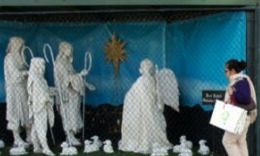Santa Monica has no room in public inn for nativity story
By Wayne Lusvardi
The First Amendment to the U.S. Constitution guarantees the free exercise of religion, but without the establishment of a state religion. Nevertheless, for Christmas in Santa Monica in 2012, the proverbial inn has no room for a nativity scene in a public park.
A federal judge has ruled that Santa Monica has the right to ban all displays, whether religious or not, in its parks at Christmas time. The ban on all displays in public parks is as politically interesting as the 2,000 year old Nativity Story: a Jewish man and his pregnant wife trying to find shelter in an inn while fleeing King Herod’s order to kill all male infants.
Ironically, Santa Monica was given the nickname of “City of the Christmas Story” for nearly 60 years of a continuous nativity displays during Christmas in its public park. The city originally got its name in 1827 from the Catholic St. Monica of Hippo crying for her incorrigible son, St. Augustine, as symbolized in the flow of water from two local springs in Santa Monica.
Nativity scene driven out of public square
What drove the nativity scene out of the park was an atheist named Damon Vix, a resident of Burbank. Vix applied for an atheist display booth in the same park. He additionally recruited 10 others to erect similar booths depicting the winter Solstice, Poseidon, Santa Claus and Satan. The reason for Vix’s display was not to enter into a dialogue with Christians or to celebrate democratic religious plurality. Contrary to either the religious or secular commercial spirit of Christmas, Vix attacked the Nativity display as myth. This year, Vix won a lottery for 18 of the 21 booth slots at the park. This reduced the annual Nativity display from 14 to 2 booths. A protest followed.
The city responded by banning all booths in the park. But the Santa Monica Nativity Scenes Committee sought a court injunction to re-open the park to their Nativity display. A federal judge denied the petition and agreed with the city’s reasons for banning all displays in public parks because there were other options for public religious speech. The nativity scene has since migrated to private property. So figuratively speaking, the offspring of St. Monica is still causing his mother city to cry.
It is not clear in the news accounts just who funded the erection of atheist booths and paid for 18 booth application fees. Nor is it clear why the city accepted applications for booths by a non-resident; or how Vix won a strange public lottery to monopolize most of the booth spaces; or why large and small booth spaces could not have been made available.
An old story about taxes and religion
Maybe Santa Monica protestors against nativity scenes in public parks should be reminded of a little history. In first century Rome, Christians were persecuted by the state for being atheists: meaning for not worshiping the establishment’s pagan gods.
If Jews became Christians in ancient Rome, they became exempt from the special tribute — i.e., tax — that was imposed on Jews. But by avoiding paying the tax, Christians were prosecuted if they boycotted established pagan cults. Jews, on the other hand, were granted “vectigalis libertas” – loosely translated as the contradiction in words: “liberty tribute” or “freedom that brings in revenue [to the state].” The Romans would tolerate the Jewish religion but only if they paid the special tax.
In Santa Monica, some of the same issues prevail. Any organization in California that doesn’t bring tax tribute to the state and public unions would be similarly driven out of the public square and socially marginalized. The Occupy Movement erected an encampment in a public park across from the Los Angeles City Hall for months, destroying the park. But the Occupy Movement was not evicted, required to get a permit, or required to make payment for the damages. That is because public employee unions funded the Occupy Movement. And the city allowed their park to be used as a political theater to demonize big business and justify higher taxes.
In California, any organization, religious or secular, that doesn’t bring tribute to the state would be similarly harassed and driven out of the public square.
In the Christian gospel of Luke 23:2 is the story about the indictment of Jesus before the Roman overseer Pontius Pilate in Jerusalem around 33 A.D.:
“Then the whole assembly rose and led him off to Pilate. And they began to accuse him, saying: ‘We should have found this man subverting our state. He opposes payment of taxes to Caesar and claims to be the Messiah, a king.’”
The story may (or may not) have been myth, as Vix contends. Nonetheless, it was more likely that a Roman overseer would have dismissed a charge of tax evasion than a charge of not paying tribute to state established pagan religions; which was punishable by death.
The issues of so-called separation of religion and state and free religious speech in California are wrapped up in the issue of taxation just as much today as in first century Rome and Jerusalem, or when the U.S. adopted the Bill of Rights in 1791.
Related Articles
Liberals should fret about poor’s fate, post-immigration ‘reform’
June 28, 2013 By Chris Reed One of the most striking things about the debate over changing our immigration laws
Bail reform tops criminal-justice efforts in next legislative session
California has long been known as a law-and-order state, particularly following the crime spikes of the 1980s. The state passed
Historic Vergara ruling finalized; state has weighty decision on appeal
A court decision that puts the interests of Latino and black students and parents on a collision course with those





